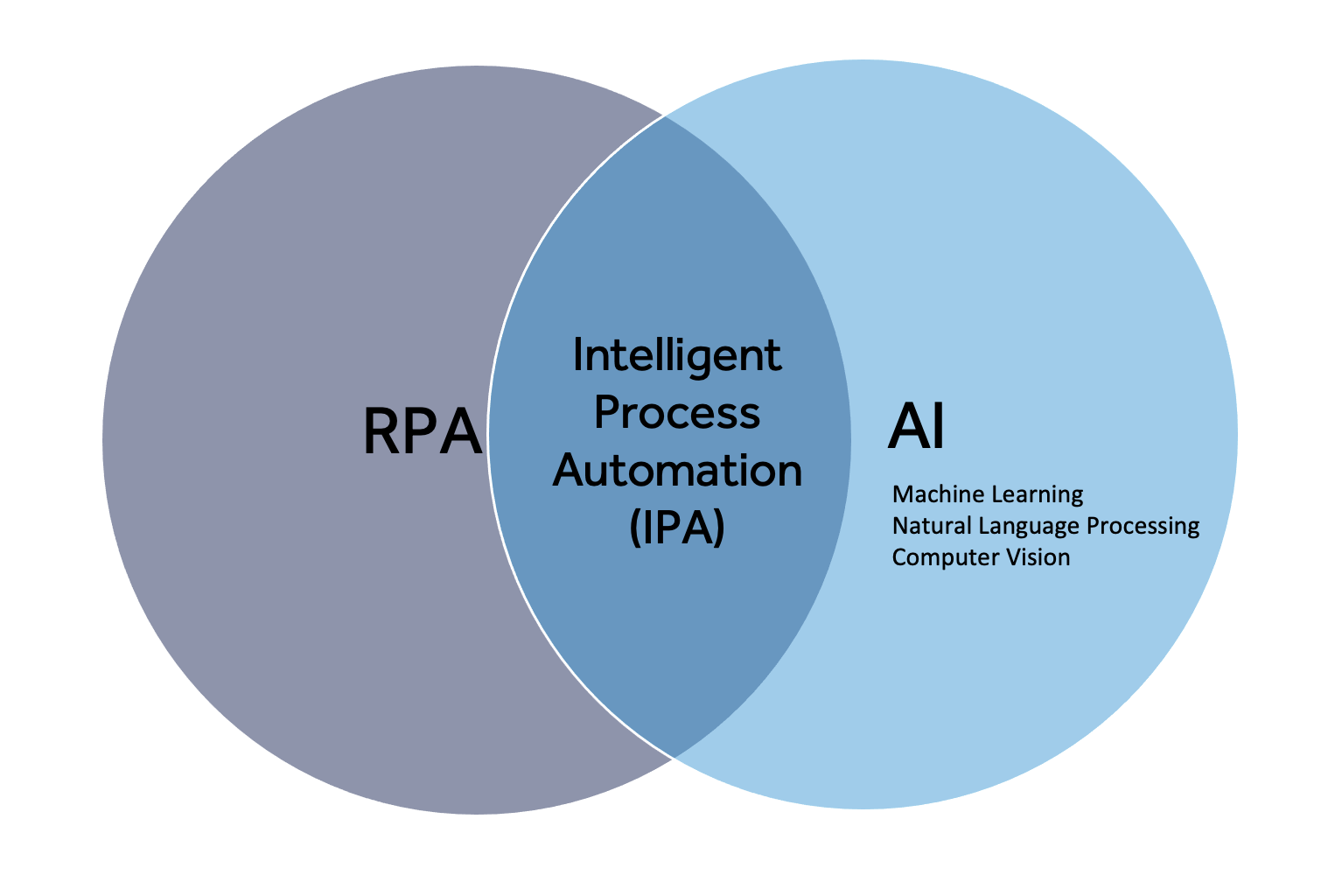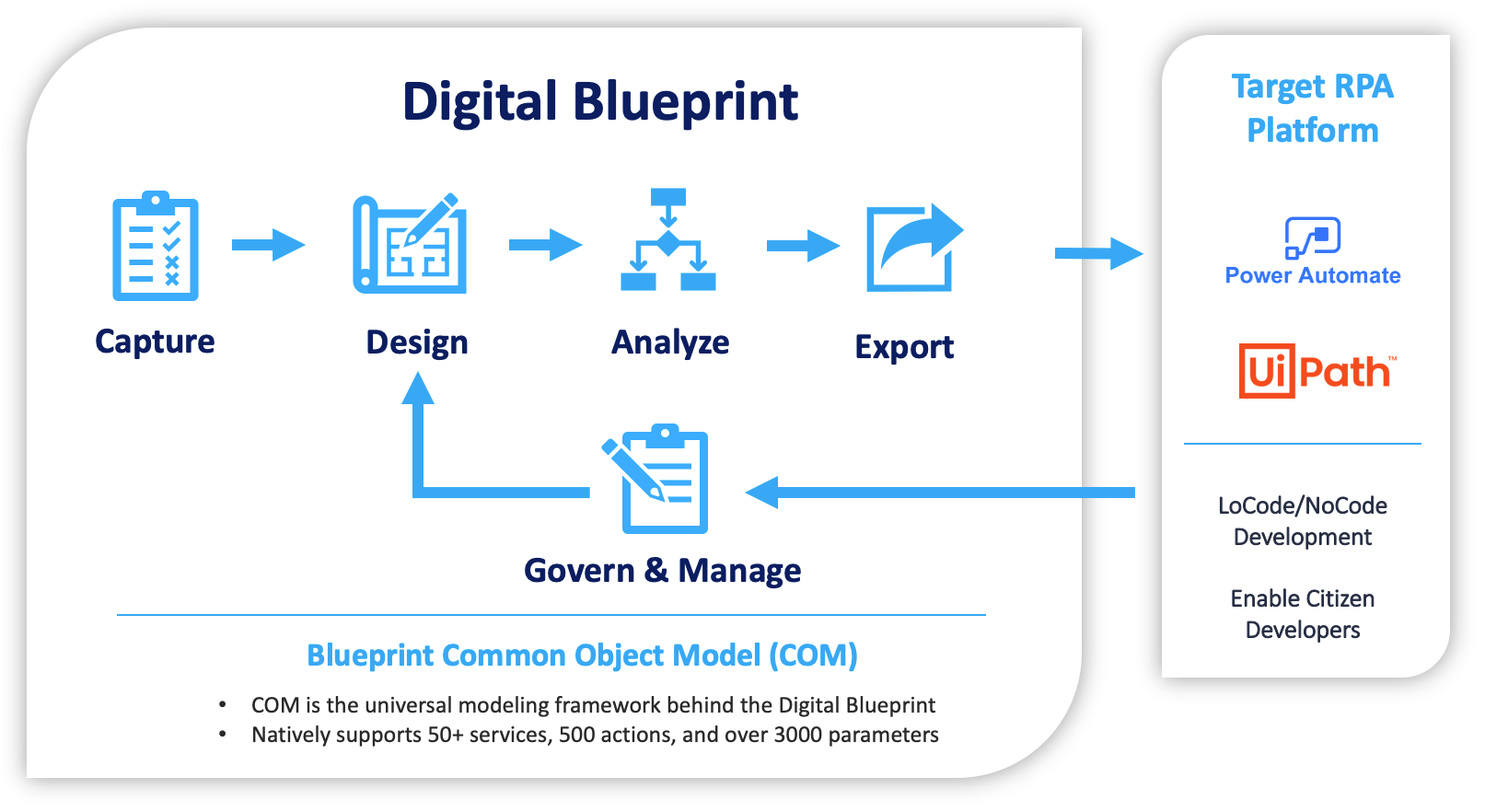Intelligent Process Automation (IPA) is part of the wave of technologies that enable organizations to reduce operational costs, improve efficiency, and deliver better employee and customer experiences. Born out of rule-based task automation, IPA is the next iteration of Robotic Process Automation (RPA) that continues to help drive digital business transformations forward.
The difference between Intelligent Process Automation (IPA) and Robotic Process Automation (RPA) technologies is that while both deal with automation, RPA is simply one of the technologies that make up Intelligent Process Automation. Robotic Process Automation is the automation of repetitive, rules-based tasks with little variation, and they are typically smaller.
But they are also decomposed processes of much larger, complex ones. For example, extracting information from invoices to input them into ERPs (enterprise resource planners) is a common RPA automated task. Still, it’s only a small piece of the much larger flow to process invoices end-to-end. Intelligent Process Automation would automate much more of that process.
And then help to remove the human intervention that introduces error and decreases execution speed. For example, machine learning can review the invoice for compliance. Decision modeling software can be leveraged to automate the checks that managers or finance teams would perform manually, and so on. In this guide, we’ll learn more about IPA in detail.
Understanding What Intelligent Process Automation (IPA) Entails
Intelligent Process Automation (IPA) is a process that uses software tools and technologies to automate business processes and tasks. Through IPA, you can automate menial tasks and streamline your business processes. It allows you to make better, more-informed business decisions, enhance your Customer Experience (UX), improve data accuracy, reduce critical errors, etc.
In other words, Intelligent Process Automation (IPA) combines different technologies to automate more complete, end-to-end business processes. It is the evolution of basic, rules-based task automation into managing and automating entire business processes comprising numerous tasks. IPA is the convergence of RPA and different AI technologies at its core.
Particularly to help automate larger decision-based business processes that traditionally required an employee to intervene and execute. The promise of Intelligent Process Automation is rooted in its ability to elevate automation to another degree of complexity, creating even more business efficiency, operational cost reduction, agility, and better customer experiences.
For your information, these Intelligent Process Automation Tools can range from simple rules-based systems to more advanced Artificial Intelligence (AI), Machine Learning (ML), and other related complex technologies. Using Intelligent Process Automation can help organizations reduce costs through improved efficiency, accuracy, and reduced labor requirements.
How Businesses Benefits From Intelligent Process Automation (IPA)
Like RPA, Intelligent Process Automation (IPA) can be applied to various industries, departments, and functions. Additionally, just like in the early days of Robotic Process Automation (RPA), some industries are early adopters with common use cases already leveraging Intelligent Process Automation to drive their businesses toward a better and more productive future.
On that note, it’s worth mentioning that as the world becomes more digitally focused, businesses must keep up with technological advances to help stay competitive. For example, in customer service, you can apply intelligent automation automatically. More so, to answer basic customer questions and inquiries, freeing your team to focus on more hands-on issues.
Not forgetting, the digitization and automation of document handling and regulatory monitoring, for example, are helping various medical-based industry businesses improve drug discovery and vaccine development. Another great example is BBVA (Banco Bilbao Vizcaya Argentaria), using computer vision to accelerate and enhance the onboarding process of new customers.
Prospects can use this technology to open bank accounts by taking a selfie. There are other examples, like in the banking industry, where computer vision helps detect fraudulent banknotes to enhance security. Below are a few other benefits:
1. Efficiency Increment
In any given department within your business, whether a storefront, a restaurant, or any other kind of business, there are likely some menial tasks your team has to perform. Even though these processes may not require a ton of brainpower, they require a human pair of eyes. You can drastically reduce the time spent on these tasks through intelligent process automation.
IPA can improve your team’s productivity allowing employees to focus on more substantial assignments. You can utilize intelligent automation in customer service, restaurant management, finance industries, healthcare, supply chain management, and more. Your team will spend less time on tedious tasks like data collection and instead focus on critical thinking work.
Just as we mentioned, Natural Language Processing (NLP) is an AI technology that interprets language and uses that information to make decisions and act. Common examples that use Natural Language Processing (NLP) are chatbots or virtual home assistants like Amazon’s Echo or Google Home.
2. Experience Improvement
We already mentioned how intelligent process automation can apply to customer service, but intelligent automation can also assist in improving your customers’ overall experience. With IPA, you can solve customer issues more efficiently; for example, if one of your customers needs a password reset to get into their account, your IPA can instantly resolve the issue.
You likely have a feedback system or survey opportunity on your website for your customers to raise questions or issues related to your website or business. Intelligent process automation can analyze your customer service data and feedback and make smart recommendations based on your data or automatically resolve basic customer inquiries.
At their core, chatbots with Natural Language Processing (NLP) are actively being used within insurance companies to automate and improve customer experiences. Specifically, they are used within an IPA framework to automate appointment scheduling and implement a self-service model for customers to select an insurance policy easily.
3. Seamless Operations
A big advantage of Intelligent Process Automation is visualizing real-time data and bringing it to customers without manual intervention. As an article in Information Age points out, pharmaceutical companies and medical device manufacturers use the greater visibility of data IPA affords to reinforce compliance by reducing fraud and errors.
While at the same time increasing security, safety, and accuracy. Not only can intelligent process optimization make your business processes more efficient, but it can also help you reduce the room for human error.
IPA can identify inefficiencies in your business operations and suggest improvements, reducing errors by automating tedious tasks and leaving them to AI while offering real-time insights to help you make more informed decisions.
4. Costs Reduction
You already know that IPA can help you automate tasks for your business, but because your team has to spend less time on your more tedious business operations, this saves your business money. In general, IPA reduces the need for a crew.
So it will take fewer employees to keep your business alive and running. Another way Intelligent Process Automation can help you reduce costs is by reducing errors. Humans are, unfortunately, mistake-prone no matter how careful we are, but with assistance from IPA, you can help reduce error, meaning you spend less time and money trying to redo your work.
5. Risks Management
No one likes data entry, and IPA allows you to automate menial tasks and reduces your margin of error because a computer is doing the work for you. Aside from reducing errors, IPA systems can also help ensure your business enhances its security and stays compliant with regulations and industry standards because you can easily and quickly automate compliance checks.
It helps enhance security by allowing you to automate cybersecurity tasks such as detecting threats and monitoring sensitive data to ensure it stays protected. In this case, we can consider ML in the Stock Market to discover patterns in data and then use those patterns to make accurate predictions. It uses data to improve systems’ performance without explicit instructions.
6. Stellar Monitoring
It’s worth mentioning that IPA is already being experimented with and applied in the Financial Services Sector to build more precise credit models. As well as to reinforce lending processes and optimize trade execution and routing.
And also leverage analytics to understand client price sensitivity and preferences. Your business is a culmination of many different moving parts. With so much to keep an eye on, it’s hard to monitor all of your various business processes.
Through intelligent process automation, your different business processes can be continually monitored in real-time, alert you immediately alert of any errors or deviations, and provide solutions to the issues. An IPA system has a view of the performance of your many different business processes, immediately flagging any issues across your business and diverse departments.
7. Continuous Innovation
Free time sparks innovation, and by giving your team some time back with Intelligent Process Automation, you can foster creativity and innovation across your different departments. Automating tedious tasks allows employees to focus on more complicated, strategy-focused tasks that require critical thinking and problem-solving, leading to new ideas and opportunities.
One thing is for sure, Intelligent Process Automation uses computing algorithms to analyze your data, giving your organization improved insights to make data-driven decisions and foster more innovative solutions to issues within your business.
The Best Practices To Get Started With IPA For Your Business
Overall, it’s worth mentioning that Artificial Intelligence (AI) combines various technologies that enable systems to perform tasks that require reason, judgment, and decision-making. AI is a computer’s ability to collect and extract information and apply logic to that data to make a decision. For instance, computer vision enables computers to parse and interpret images.
At a high level, IPA comprises two major market technologies: RPA and AI. However, at a more granular level, specific AI technologies serve different purposes but are key components of IPA that enable the cognitive capabilities to automate more complex business processes. That said, if you’re considering using IPA for your business, there are a few aspects to note.
Consider the following aspects:
- Identify what you can automate
- Define your goals for using intelligent process automation
- Map out your workflow
- Set up automation
- Run tests
To properly use IPA, ensure you know which of your business processes you plan on automating and what your goal is for doing so. Is it to reduce error or improve efficiency? Your goal will help you keep your focus as you design your automation system. You’ll then need to cross-reference your existing workflow process and compare it to how it will change with automation.
You should also get your team involved in this process so it can be as detailed as possible and collaborate on ideas for improvement. Once you’ve set up your automation, you can run tests to ensure it’s benefitting your business. IPA is the future of automation, and while not quite at saturation, RPA is definitely out of the hype cycle and being implemented widely.
A Blueprint That Enables Intelligent Process Automation At Scale
Automation is meant to reduce manual effort. The successful application of Intelligent Process Automation is dependent on quality efforts. By definition, artificial intelligence is combined with RPA to marry the task execution of bots with the intelligence and use of analytics that AI provides so complex, end-to-end business processes can be automated for bigger returns.
Therefore, a solution is needed to consolidate these tools; otherwise, a disconnected, siloed IPA architecture will result in future failure. That’s where Blueprint comes in — to enumerate, Blueprint’s Business Transformation Platform is the heart of your Intelligent Process Automation toolchain — with the most powerful automation design environment on the market.
Especially where end-to-end automations that combine RPA and AI technologies can be designed, planned, and managed in a Digital Blueprint. Your custom business Digital Blueprints contain everything you need to drive intelligent automation in your organization. From detailed process flows, functional and non-functional requirements, user stories, compliance, etc.
As well as regulatory requirements, to both functional and acceptance tests, among other critical information for successful solution delivery. They can be used to drive any number of Intelligent Process Automation use cases such as RPA, the migration of legacy applications, custom development, or for commercial off-the-shelf technology implementations.
In Conclusion;
There are many reasons to take advantage of intelligent process automation. From reducing error, improving efficiency, increasing customer satisfaction, and protecting your business, there are many ways IPA can benefit your business while saving you money. When investing in an intelligent process automation system, it’s essential that you carefully review the tool first.
And then, consider the potential benefits and costs of implementing IPA and find a trusted vendor or service provider — someone who can help you implement the system into your business. What more could you ask for? Download a copy of the Blueprint Business Transformation Platform Datasheet and discover how Blueprint enables IPA at a great scale.
About The Author:
Katelyn Andrews is the Content Marketing Manager for SevenRooms. She spent the earlier part of her career in the restaurant business as an event planner and manager but now spends her time writing for the industry she loves, just like this article.







Intelligent Process Automation is transforming industries by optimizing operations, enhancing customer experiences, and fostering innovation. By leveraging the power of RPA, AI, and ML, businesses can achieve unparalleled efficiency, productivity, and competitiveness. Embracing IPA is not just a technological upgrade; it is a strategic decision that propels businesses towards a future of intelligent, agile, and customer-centric operations. The potential of IPA is limitless, and I am excited to witness the incredible transformations it will continue to bring to organizations worldwide.